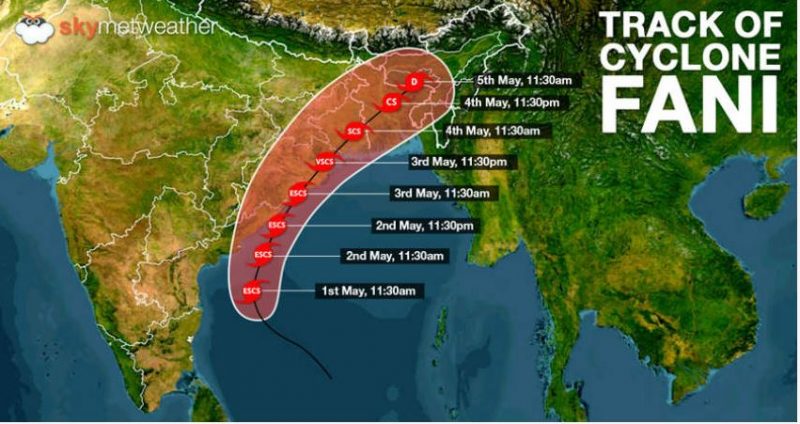

Pic Courtesy: Skymetweather.com
Cyclone Fani, officially categorised as a category 4 or extremely severe storm, is expected to make landfall, or hit the Odisha Coast on Friday at 5:30 p.m. As of now, this is one of the strongest cyclones headed Odisha’s way, but hopefully, the state is much better prepared to handle it this time. Not to mention West Bengal, which is on heavy rain and flood alert.
So just why does the Bay of Bengal generate more cyclones, as compared to say, the Arabian Sea? When was the last time Mumbai, for instance, prepared for a cyclone of this intensity? don’t recall? Here’s why.
In scientific jargon, Cyclones are intense water-rotating systems formed by strong winds (of speeds over 60 km/hour) around low-pressure areas. They have a distinct spiral, anticlockwise movement. High sea surface temperature, vertical changes in wind speed inside the spiral, and high relative humidity help cyclones form and intensify. These are conditions the Bay of Bengal provides, more often than not.
This happens since it gets higher rainfall, and slower wind conditions keep temperatures relatively high at around 28 degrees through the year. Warm air currents only enhance this, making it a fertile for cyclones.
Unlike the Arabian Sea, the bay of Bengal also receives the Ganga and Brahmaputra rivers into its waters. This constant flow of fresh water prevents the warm waters on top from mixing with cooler water below, again creating solid grounds for depression formation. The Arabian Sea also gets much stronger wind systems, helping it stay cooler, and hence suppressing cyclone formation at the scale they do in the Bay of Bengal.
Hence, its combination of river flows, and higher surface temperature, besides slower winds, make the Bay ground zero for cyclone formation in the region.
In Odisha, where the temple city of Puri is set to bear the first contact with the cyclone, over 800,000 people have been evacuated already, and 879 cyclone shelters have also been set up with provisions. All fishing vessels in the area are already on their way back to coast, to be sheltered in safe waters. The 1999 super cyclone, which claimed close to 10,000 lives is still fresh in the memory of the state, and no chances are being taken this time.
Keep in mind that tropical cyclones typically drop speeds very fast on contact with land, besides changing direction right till the last hour, so one can be hopeful that the damage will be contained.
Cyclone Fani, pronounced (Foni in Bangla and meaning ‘hood of a snake’ ) may not live up to its hopeful phonetic name, but here’s hoping it doesn;t live up to its literal name too.
1. The mandate for blending Compressed Biogas (CBG) with natural gas has come into effect…
Andhra Pradesh is striving towards greening its energy sector with quite some speed. In a…
With an objective to bolster India’s green energy goals, a Tripartite Agreement has been signed…
The Union MNRE Minister Pralhad Joshi launched the Green Hydrogen Certification Scheme of India (GHCI)…
India’s energy conglomerate Bharat Petroleum Corporation Limited (BPCL) has commissioned a 5MW green hydrogen plant…
In a historical development, the European Space Agency (ESA) has successfully launched its pioneering ‘Biomass’…